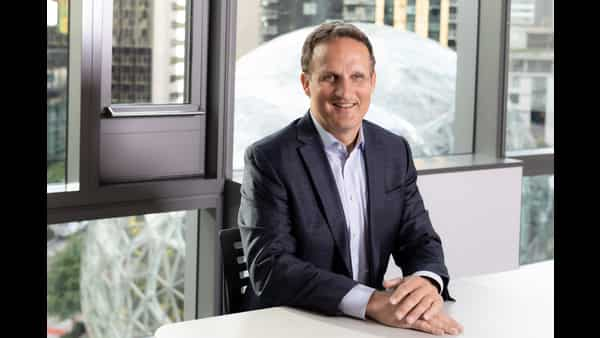[ad_1]
In an interview on the sidelines of the company’s annual re:Invent conference in Las Vegas, Selipsky spoke about how customers can gain by shifting more of their workloads to the cloud, especially during economic uncertainties, and how AWS is committed to India for the long term. Edited excerpts:
How is the economic uncertainty in the US impacting AWS’ business, and how do you plan to stay resilient?
There’s no doubt this is a time of economic uncertainty, and while we do see some of our customers tightening their belts, the good news is that many of our customers are actually leaning in more quickly and more deeply into the cloud. And that’s because they understand that cloud can bring both cost-efficiency, scale and flexibility especially in the face of uncertainty.Airbnb is a good example. It was already a significant cloud user and they were far more prepared than many others when the bottom fell out of the hospitality industry in 2020. Airbnb was able to take down their cloud spending by 27% and was able to quickly turn on the cloud infrastructure that they needed, and continue to drive innovation. As we are fully capitalizing on this opportunity, I do not see the impending downturn can negatively impact AWS’ business.
How do you plan to retain leadership in the cloud market considering the heightened competition from Microsoft Azure and Google Cloud?
Our success metrics relate to our customers, not to our competitors. This is fundamental to how Amazon thinks across all of its businesses. Many other companies have chosen competitively focused strategies. In contrast, we spend 95% of our time worrying about what customers think, not about what competitors are doing. So, our success metrics are around our customers, how quickly they’re adopting the cloud, what their experiences are, what kind of availability they have, and of course, ensuring they have the highest level of security, cost savings, agility, and ultimately, a high return on their investment. We will continue to be customer-obsessed.
How does India’s digital data protection bill, in the current form, impact AWS’s business?
We’re very committed to India for the long term. We are aware that every country has its own regulations, laws and customs around data and around digital sovereignty. We respect those in each country, and we work with both the government of each country where we operate in, as well as with our customers.
We were actually the first global cloud service provider to be certified in India in 2017 by the ministry of electronics and we continue to work closely with the government to ensure we abide by these rules. A very recent proof point of that is just last week, when we launched our second full infrastructure region in India in Hyderabad, and we already had launched our Mumbai region in 2016. Only with our Mumbai region, we’ve invested $3.7 billion. And with, Hyderabad, by the year 2030, we expect to invest $4.4 billion. Importantly, we expect that this new commitment in Hyderabad will result in $7.6 billion of increased GDP for India. And the reason why we’re building infrastructure in India is because we know that there are regulations as well as customs around data residency, and having two full-fledged regions in India gives not only great latency, but also great disaster recovery, backup and resilience capabilities for all sorts of workloads that customers want to keep within India.
Emerging tech like AI/ML blockchain, IoT and the metaverse would not be possible at scale without cloud computing as the enabler. What are your plans with these technologies going ahead?
We’ve deeply invested in a lot of those technologies. Much of the metaverse today is built on AWS. This means, if you look at the big gaming companies who are part of the metaverse like Riot Games and Epic, just to name two, they are built deeply on AWS. A lot of Meta’s AI workloads run on AWS. There are many other examples. And then, you know, all of the extremely powerful machine learning (ML) capabilities that we’ve created – the fact that we do have these custom chips which go into specialized compute instances, which allow companies above the metaverse to both train machine learning models and then to deploy them into production. So, we’re going to continue to invest deeply in not only machine learning and AI, but also in other capabilities that will power companies running in the metaverse, including blockchain capabilities.
Regulated industries such as banking, government, healthcare, etc., have moved some of their applications and workloads to the public cloud, but their core systems remain on premises?
What I see is that banks are quickly moving to the cloud. New business models and innovative competition are driving them to do so. They are fast moving away from on-premise technology, and are focusing instead on their expertise in banking, rather than in IT. The cloud offers several business benefits for traditional banking organizations, including increased flexibility, business agility, lower cost of IT, and quicker access to innovation.
In India itself, take for example, Axis Bank, which is moving over 70% of its workloads to AWS in the next couple of years. We work with financial services companies around the world like the CommonWealth Bank and NAB in Australia, and JP Morgan Chase to name a few. Another example is one of US’ largest financial firm Capital One who have closed all their data centres and have moved to the cloud, they are all in AWS.
Yes, some will operate in a hybrid mode as they move workloads over from on-premise data centres. Whether it’s healthcare, financial services, energy industry, telecom, or other regulated industries, they are moving to the cloud and we are already working with many of them across the globe.
Since you have worked with leaders like Jeff Bezos and Andy Jassy, how different is your leadership style from theirs?
Everyone has their own leadership style, and it’s a mistake to try and be somebody else. You can only be yourself and I think you’ll be the best leader you can be if you’re authentic, and try and be who you are. And those are great leaders, with a lot of amazing qualities. My job is to be the best version of myself that I can be.
Things that I value a lot are authenticity, and empathetic listening and understanding where people are coming from, their thoughts, their discussions. I find that even if we make decisions at the end of the day, with which people disagree, they stay onboard if they respect the process, and they feel that they were really listened to, with an open mind.
I think that Amazon has a lot of resources, a lot of capabilities and ability to invent that few other companies have, and I think that gives us both the opportunity and the responsibility to really be citizens of our local communities, our national communities and all the way up to our global community on issues like sustainability, which is very important to me. And so, I’m very eager to continue to figure out how can Amazon be a great citizen on all of these levels.
The writer was in Las Vegas at the invitation of AWS.
Download The Mint News App to get Daily Market Updates & Live Business News.
[ad_2]
Source link
John Miller has been writing about science, gaming, and tech culture for over a decade. He’s a top-rated reviewer with extensive experience helping people find the best deals on tech and more.



